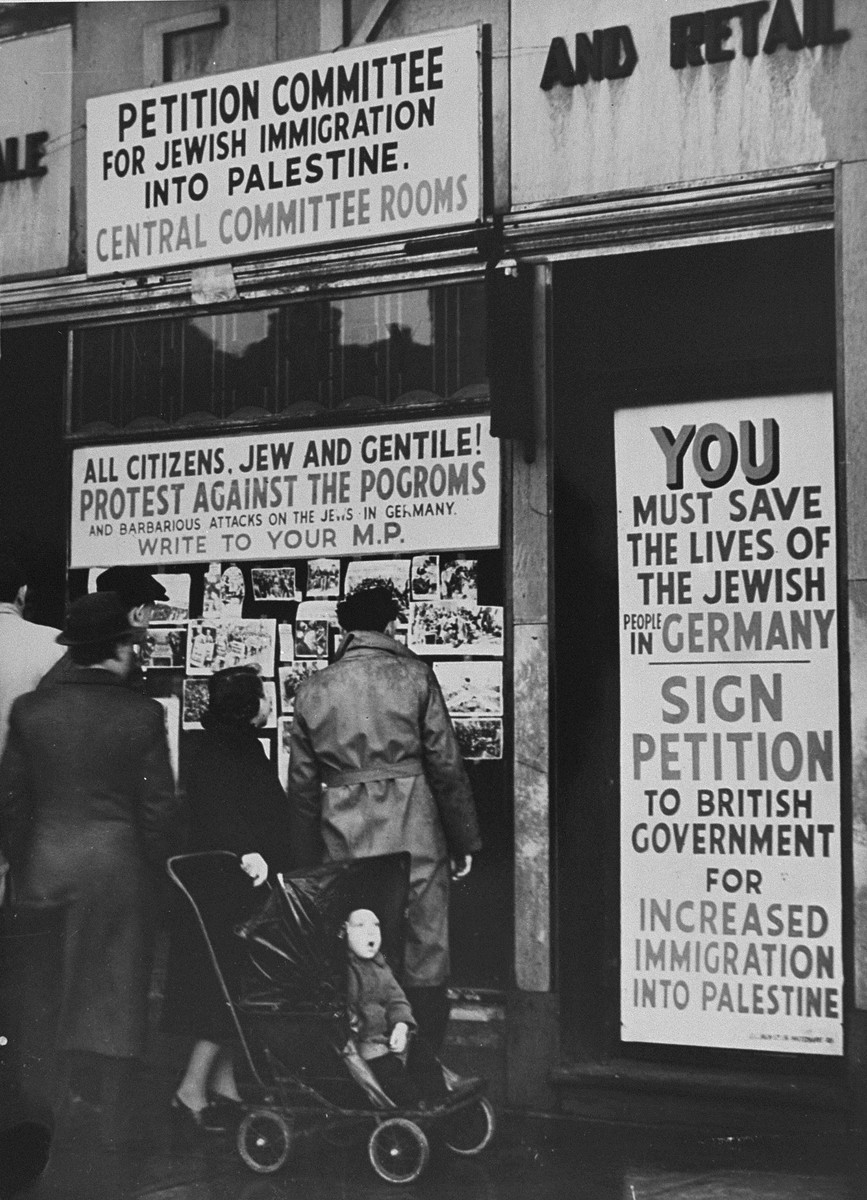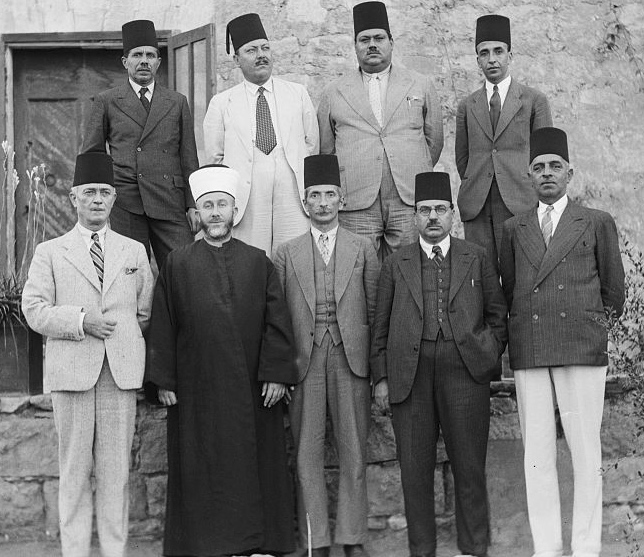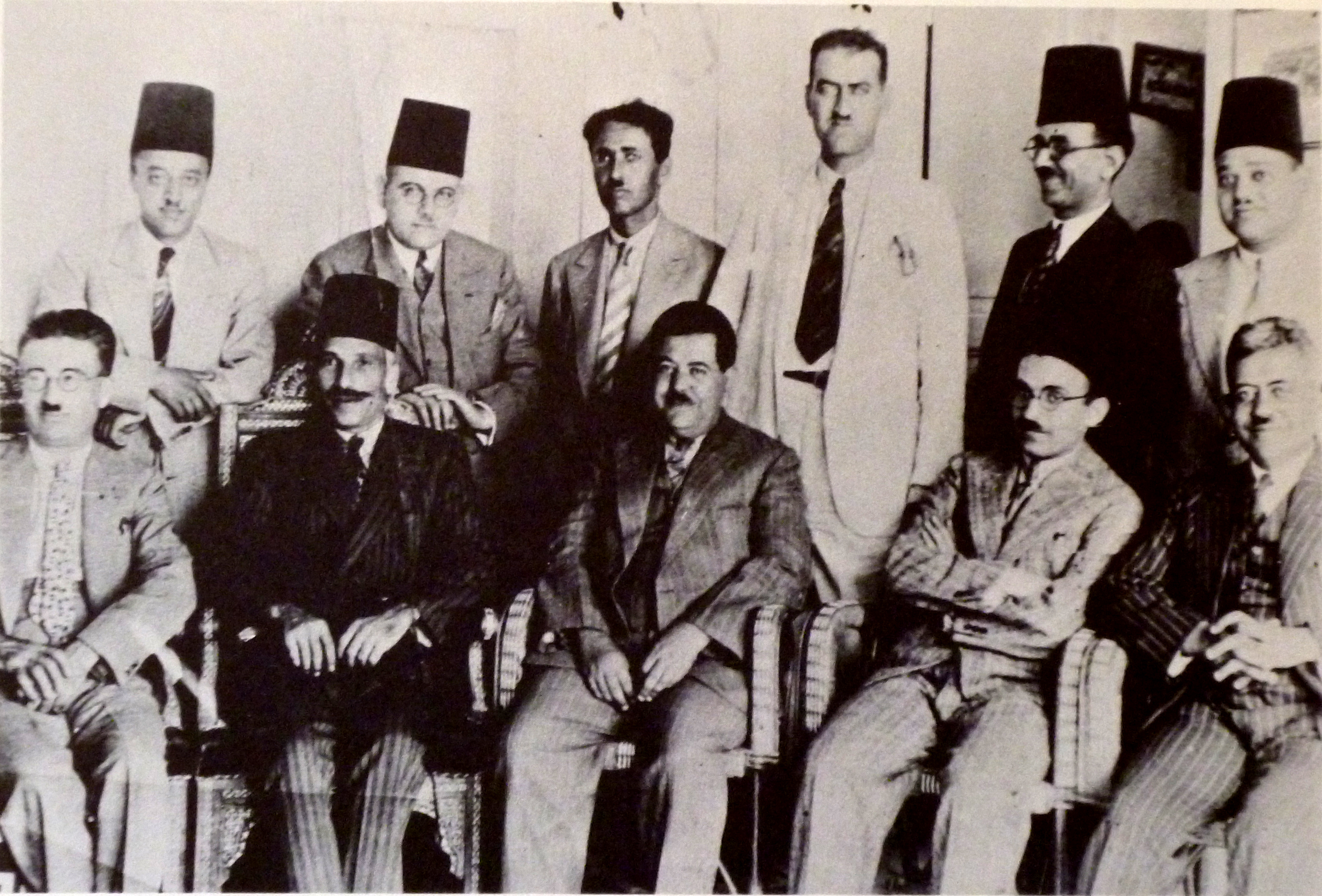|
Ahmed Hilmi Pasha
Ahmed Hilmi Abd al-Baqi ( ar, أحمد حلمي عبد الباقي 1883 - 1963) was a soldier, economist, and politician, who served in various post-Ottoman Empire governments, and was Prime Minister of the short-lived All-Palestine Government in the Gaza Strip. Early life He was born 1883 in Sidon and was of Albanians, Albanian origin, being to referred to as al-Arnauti by contemporaries such as Nabih al-Azma, Izzat Darwaza and ‘Ajaj Nuwayhid. Before the collapse of the Ottoman Empire Hilmi attained the rank of General in the Ottoman army. In 1920 he was Minister of Finance for the short-lived Arab Kingdom of Syria in Damascus. He became the Minister of Finance of Jordan, finance minister in Emirate of Transjordan, Transjordan from 1922 to 1924. He was a member of the Committee of Union and Progress. In Mandatory Palestine In 1925, he became the Director General of Waqf, Awqaf in Mandatory Palestine, the organisation headed by Haj Amin al-Husseini, Haj Amin Husseini, which co ... [...More Info...] [...Related Items...] OR: [Wikipedia] [Google] [Baidu] |
Prime Minister
A prime minister, premier or chief of cabinet is the head of the cabinet and the leader of the ministers in the executive branch of government, often in a parliamentary or semi-presidential system. Under those systems, a prime minister is not the head of state, but rather the head of government, serving under either a monarch in a democratic constitutional monarchy or under a president in a republican form of government. In parliamentary systems fashioned after the Westminster system, the prime minister is the presiding and actual head of government and head/owner of the executive power. In such systems, the head of state or their official representative (e.g., monarch, president, governor-general) usually holds a largely ceremonial position, although often with reserve powers. Under some presidential systems, such as South Korea and Peru, the prime minister is the leader or most senior member of the cabinet, not the head of government. In many systems, the prime minister ... [...More Info...] [...Related Items...] OR: [Wikipedia] [Google] [Baidu] |
Nabih Al-Azma
Nabih al-Azma (Arabic: نبيه العظمة; 1886 – 1964) was a Syrian politician and the defense minister of Syria in 1946. Background Nabih was born in Damascus in 1886 to a notable family in Damascus and he is the nephew of Yusuf al-'Azma Yusuf al-Azma ( ar, يوسف العظمة, ALA-LC: ''Yūsuf al-ʻAẓmah''; 1883 – 24 July 1920) was the Syrian minister of war in the governments of prime ministers Rida al-Rikabi and Hashim al-Atassi, and the Arab Army's chief of general sta .... He studied at the Ottoman Military Academy and graduated in 1917 from Istanbul. Career He was elected to the Syrian parliament, and served as defense minister in 1946. References Syrian ministers of defense Al-Azma family 1886 births 1964 deaths {{Syria-politician-stub ... [...More Info...] [...Related Items...] OR: [Wikipedia] [Google] [Baidu] |
White Paper Of 1939
The White Paper of 1939Occasionally also known as the MacDonald White Paper (e.g. Caplan, 2015, p.117) after Malcolm MacDonald, the British Colonial Secretary, who presided over its creation. was a policy paper issued by the British government, led by Neville Chamberlain, in response to the 1936–1939 Arab revolt in Palestine. After its formal approval in the House of Commons on 23 May 1939,by 268 votes to 179. it acted as the governing policy for Mandatory Palestine from 1939 to the 1948 British departure. After the war, the Mandate was referred to the United Nations. The policy, first drafted in March 1939, was prepared by the British government unilaterally as a result of the failure of the Arab-Zionist London Conference. The paper called for the establishment of a Jewish national home in an independent Palestinian state within 10 years, rejecting the Peel Commission's idea of partitioning Palestine. It also limited Jewish immigration to 75,000 for five years and ruled th ... [...More Info...] [...Related Items...] OR: [Wikipedia] [Google] [Baidu] |
Seychelles
Seychelles (, ; ), officially the Republic of Seychelles (french: link=no, République des Seychelles; Creole: ''La Repiblik Sesel''), is an archipelagic state consisting of 115 islands in the Indian Ocean. Its capital and largest city, Victoria, is east of mainland Africa. Nearby island countries and territories include the Comoros, Madagascar, Mauritius, and the French overseas departments of Mayotte and Réunion to the south; and Maldives and the Chagos Archipelago (administered by the United Kingdom as the British Indian Ocean Territory) to the east. It is the least populated sovereign African country, with an estimated 2020 population of 98,462. Seychelles was uninhabited prior to being encountered by Europeans in the 16th century. It faced competing French and British interests until coming under full British control in the late 18th century. Since proclaiming independence from the United Kingdom in 1976, it has developed from a largely agricultural society to ... [...More Info...] [...Related Items...] OR: [Wikipedia] [Google] [Baidu] |
Arab Higher Committee
The Arab Higher Committee ( ar, اللجنة العربية العليا) or the Higher National Committee was the central political organ of the Arab Palestinians in Mandatory Palestine. It was established on 25 April 1936, on the initiative of Haj Amin al-Husayni, the Grand Mufti of Jerusalem, and comprised the leaders of Palestinian Arab clans and political parties under the mufti's chairmanship. The committee was outlawed by the British Mandatory administration in September 1937 after the assassination of a British official. A committee of the same name was reconstituted by the Arab League in 1945, but went to abeyance after it proved ineffective during the 1948 Arab-Israeli War. It was sidestepped by Egypt and the Arab League with the formation of the All-Palestine Government in 1948 and both were banned by Jordan. Formation, 1936–37 The first Arab Higher Committee was formed on 25 April 1936, following the outbreak of the Great Arab revolt, and national committees w ... [...More Info...] [...Related Items...] OR: [Wikipedia] [Google] [Baidu] |
Independence Party (Palestine)
, founded = 13 August 1932 , dissolved = 1947 , ideology = Arab nationalismPalestinian nationalism Anti-tribalismConstitutional monarchism Hashemite monarchismAnti-ZionismPan-Arabism , founders = Izzat Darwaza Fahmi al-Abboushi Mu'in al-MadiAkram Zu'aytir‘Ajaj Nuwayhid Rashid al-Hajj IbrahimSubhi al-KhadraSalim Salamah , slogan = "England is the root of the illness and the basis of all disaster"(rhyming in Arabic: ''Inkilitira asl al-da’ w-asas kul bila’'') The Independence Party of Palestine (''Hizb al-Istiqlal'') was an Arab nationalist political party established on 13 August 1932 in Palestine during the British Mandate. The party was founded by Muhammad Izzat Darwaza, and the other founders of the party were Fahmi al-Abboushi, Mu'in al-Madi, Akram Zu'aytir, ‘Ajaj Nuwayhid, Rashid al-Hajj Ibrahim, Subhi al-Khadra, and Salim Salamah. The party did not achieve a large membership but Awni Abd al-Hadi, through his role as ... [...More Info...] [...Related Items...] OR: [Wikipedia] [Google] [Baidu] |
Arab Bank
Arab Bank is one of the largest financial institutions in the Middle East, founded in 1930 in Jerusalem, Mandatory Palestine, as the first private sector financial institution in the Arab world. Headquartered today in Amman, Jordan, it serves clients in more than 600 branches spanning five continents. Arab Bank is a publicly held shareholding company listed on the Amman Stock Exchange. The bank is a major economic engine in Jordan and throughout the Middle East and North Africa region, providing banking services and capital, and facilitating development and trade throughout the region. According to its website, the bank is the highest-ranked by market capitalization, and represents approximately 25% of the Amman Stock Exchange. U.S. appellate courts have ruled in the bank's favor in several lawsuits filed in the 2000s alleging its involvement in facilitating the funding of terrorist organizations. History Establishment (1940–1970s) In the 1940s and 1950s, the bank grew t ... [...More Info...] [...Related Items...] OR: [Wikipedia] [Google] [Baidu] |
Haj Amin Al-Husseini
Mohammed Amin al-Husseini ( ar, محمد أمين الحسيني 1897 – 4 July 1974) was a Palestinian Arab nationalist and Muslim leader in Mandatory Palestine. Al-Husseini was the scion of the al-Husayni family of Jerusalemite Arab notables, who trace their origins to the eponymous grandson of Muhammad. Husseini received education in Islamic, Ottoman, and Catholic schools. In 1912, he went to pursue further studies in Cairo's ''Dar al-Da'wa wa al-Irshad'', an Islamic seminary under the tutelage of Salafist theologian Muhammad Rashid Rida. After studying there for two years, he went on to serve in the Ottoman army in World War I. At war's end he stationed himself in Damascus as a supporter of the Arab Kingdom of Syria. Following the Franco-Syrian War and the collapse of Arab Hashemite rule in Damascus, his early position on pan-Arabism shifted to a form of local nationalism for Palestinian Arabs and he moved back to Jerusalem. From as early as 1920 he actively opposed Zion ... [...More Info...] [...Related Items...] OR: [Wikipedia] [Google] [Baidu] |
Mandatory Palestine
Mandatory Palestine ( ar, فلسطين الانتدابية '; he, פָּלֶשְׂתִּינָה (א״י) ', where "E.Y." indicates ''’Eretz Yiśrā’ēl'', the Land of Israel) was a geopolitical entity established between 1920 and 1948 in the region of Palestine under the terms of the League of Nations Mandate for Palestine. During the First World War (1914–1918), an Arab uprising against Ottoman rule and the British Empire's Egyptian Expeditionary Force under General Edmund Allenby drove the Ottoman Turks out of the Levant during the Sinai and Palestine Campaign. The United Kingdom had agreed in the McMahon–Hussein Correspondence that it would honour Arab independence if the Arabs revolted against the Ottoman Turks, but the two sides had different interpretations of this agreement, and in the end, the United Kingdom and France divided the area under the Sykes–Picot Agreementan act of betrayal in the eyes of the Arabs. Further complicating the issue was t ... [...More Info...] [...Related Items...] OR: [Wikipedia] [Google] [Baidu] |
Waqf
A waqf ( ar, وَقْف; ), also known as hubous () or '' mortmain'' property is an inalienable charitable endowment under Islamic law. It typically involves donating a building, plot of land or other assets for Muslim religious or charitable purposes with no intention of reclaiming the assets. A charitable trust may hold the donated assets. The person making such dedication is known as a ''waqif'' (a donor). In Ottoman Turkish law, and later under the British Mandate of Palestine, a ''waqf'' was defined as usufruct state land (or property) from which the state revenues are assured to pious foundations. Although the ''waqf'' system depended on several hadiths and presented elements similar to practices from pre-Islamic cultures, it seems that the specific full-fledged Islamic legal form of endowment called ''waqf'' dates from the 9th century AD (see below). Terminology In Sunni jurisprudence, ''waqf'', also spelled ''wakf'' ( ar, وَقْف; plural , ''awqāf''; tr, vak ... [...More Info...] [...Related Items...] OR: [Wikipedia] [Google] [Baidu] |
Committee Of Union And Progress
The Committee of Union and Progress (CUP) ( ota, اتحاد و ترقى جمعيتی, translit=İttihad ve Terakki Cemiyeti, script=Arab), later the Union and Progress Party ( ota, اتحاد و ترقى فرقهسی, translit=İttihad ve Terakki Fırkası, script=Arab), was a secret revolutionary organization and political party active between 1889 and 1926 in the Ottoman Empire and the Republic of Turkey. The foremost faction within the Young Turk movement, it instigated the 1908 Young Turk Revolution, which ended absolute monarchy and began the Second Constitutional Era. From 1913 to 1918, the CUP ruled the empire as a one-party state and committed genocides against the Armenian, Greek, and Assyrian peoples as part of a broader policy of ethnic erasure during the late Ottoman period. The CUP was associated with the wider Young Turk movement, and its members have often been referred to as Young Turks, although the movement produced other political parties as well. Within t ... [...More Info...] [...Related Items...] OR: [Wikipedia] [Google] [Baidu] |
Damascus
)), is an adjective which means "spacious". , motto = , image_flag = Flag of Damascus.svg , image_seal = Emblem of Damascus.svg , seal_type = Seal , map_caption = , pushpin_map = Syria#Mediterranean east#Arab world#Asia , pushpin_label_position = right , pushpin_mapsize = , pushpin_map_caption = Location of Damascus within Syria , pushpin_relief = 1 , coordinates = , subdivision_type = Country , subdivision_name = , subdivision_type1 = Governorate , subdivision_name1 = Damascus Governorate, Capital City , government_footnotes = , government_type = , leader_title = Governor , leader_name = Mohammad Tariq Kreishati , parts_type = Municipalities , parts = 16 , established_title = , established_date ... [...More Info...] [...Related Items...] OR: [Wikipedia] [Google] [Baidu] |





.jpg)



